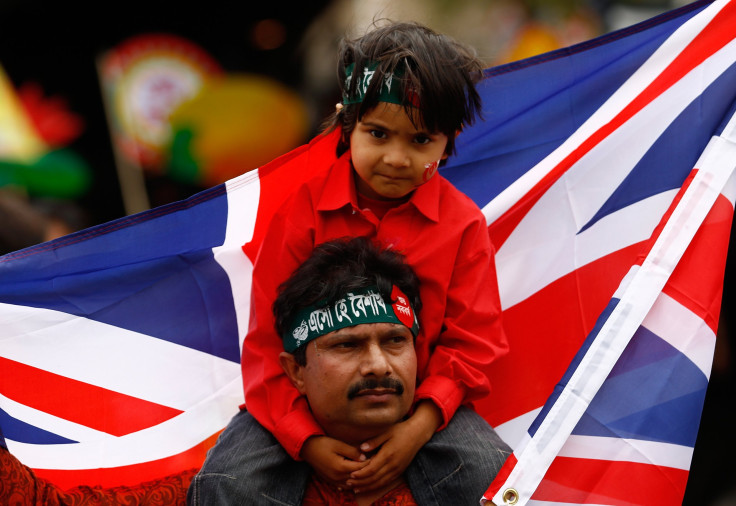Bangladeshis In Britain Proud To Be ‘British,’ But Not ‘English’

Despite a near-constant stream of angst about immigration and widespread Islamophobia in the United Kingdom, an academic study suggests that Bangladeshi immigrants and their descendants in the country feel the most proud to call themselves “British.”
According to a survey by the Center on Dynamics of Ethnicity (CoDE) at the University of Manchester, ethnic minorities in the country were more likely to describe themselves as exclusively “British” than their white Briton counterparts.
The findings were based on the 2011 national Census, whereby respondents were allowed to list multiple national identities, for example, “English,” “Welsh,” “Scottish,” “Northern Irish,” “British” or “Other.”
More than one-third (38 percent) of ethnic minorities described themselves solely as “British,” while only 14 percent of white Britons did so. Indeed, 72 percent of Bangladeshis, 63 percent of Pakistanis and 58 percent of Indians reported an exclusive “British” identity – in contrast, 72 percent of white Britons preferred to call themselves “English” rather than the more expansive “British” designation.
In response to these findings, the survey’s authors noted that the British government’s plans to promote “mainstream British values” appear to be at odds with the sense of national identity in England. They cite that three-fifths of the population do not identify with a “British” national identity, and only see themselves as “English.”
“This begs the question, what is the purpose of placing so much emphasis on encouraging ethnic minorities and new migrants to the U.K. to accept ‘British’ life and ‘British’ values?” the authors ask.
“Increasing aspirations of ’Britishness’ amongst ethnic minorities might only have led to the creation of new minority forms of identity. It is often assumed that, for the English, ‘Englishness’ is synonymous with ‘Britishness’ and that the values of these identities are the same. When given an option of reporting British and English dual national identity, less than a tenth of the population in England choose this.”
Bangladeshis in Britain, who are heavily concentrated in London, particularly in the East End, are among the poorest and most deprived communities in the United Kingdom, suffering from high rates of poverty, unemployment and undereducation. Of an estimated half-million Bangladeshis living in the United Kingdom, according to the 2011 Census, about half live in London, with a heavy concentration in Tower Hamlets borough of East London. In Tower Hamlets, an estimated one-third of young Bangladeshis are unemployed, one of the highest such rates in the country.
A study from 2009 by the University of Surrey suggested that some Bangladeshis in Britain, particularly the youth, embrace their ”Britishness” while feeling alienated from “Englishness.” The underlying assumption was that “Englishness” was associated with “whiteness” whereas “Britishness” denoted a more universal kind of identity that encompasses various cultural and racial backgrounds.
The research, conducted by the Centre for Research on Nationalism, Ethnicity and Multiculturalism (CRONEM), asked a number of British Bangladeshi youths in South Camden, London, many questions about their attitudes and feelings of identity.
A 16-year-old boy named Abdul said he was “very proud” to be “British” because “I have a shelter, a place to live, I have a nice family. … The government is good.” However, a 13-year-old lad named Ahmed directly linked “Englishness” with “whiteness,” while embracing being “British.” “English culture [seems to exclude] Asian people and [in] British [culture] there’s more Asian and more black people,” he said. “English culture is mostly white people. But if you’re British it’s multicultural.”
A Bangladeshi girl named Muna spelled it out explicitly: “It’s possible for Bengali people to be British, but not English.”
© Copyright IBTimes 2024. All rights reserved.





















